Given the absence of women in the presidential proposal to fill the vacancies in the Supreme Court of Justice of the Nation, a group of 12 civil society organizations sent a letter to the president of the Agreements Commission of the Chamber of Senators, Guadalupe Tagliaferri, so that the public hearing for the appointment of the two male judges proposed by the Executive Branch does not begin because it is unconstitutional and discriminatory based on gender. Likewise, it implies a strong setback in the diversity that the highest court must have, with a serious impact on its legitimacy.
“Below, we offer a google translate version of the original article in Spanish. This translation may not be accurate but serves as a general presentation of the article. For more accurate information, please switch to the Spanish version of the website. In addition, feel free to directly contact in English the person mentioned at the bottom of this article with regards to this topic”.
In all of Argentine history there were only three women in the Court compared to 104 men. Instead of reversing this alarming reality, the Executive Branch decided to integrate this court only with men. Today it is the Agreements Commission of the Upper House, the body that has the historic opportunity to prevent us from having an absolutely male Court for at least 7 years, leaving out women who meet the conditions to occupy that position and reinforcing the stereotypes that block their access to places of power and decision-making.
The moments of greatest political participation of women in these spaces also coincided with important advances in gender matters. The creation of the Court’s Women’s Office and the Domestic Violence Office, fundamental organizations for documenting and reversing discrimination and violence, took place when Carmen Argibay and Elena Highton de Nolasco were part of the highest judiciary.
An equal integration of the Supreme Court and equal access to public positions, especially in hierarchical and power bodies, are political rights of women and the State has the obligation to make them effective, in accordance with the commitments assumed in international rights treaties. humans with constitutional hierarchy. Likewise, Decree 222/03 includes these standards for the process of appointing judges to the Court and establishes that a diverse gender composition must be promoted when defining appointments.
Although in the Argentine Judiciary 57% of the staff is made up of women, they occupy only 31% of the positions of judges in the national and federal justice system and only 29% of the highest authorities there.
It is the duty of the Executive Branch to propose women for the Court who have the qualities, suitability and commitment to the rights required for such a function and, of the Legislative Branch, to promote and ensure that said obligation is fulfilled.
For this reason, Amnesty International, the Latin American Justice and Gender Team (ELA), the Women’s Network for Justice, the Foundation for the Development of Sustainable Policies (Fundeps), Women in Equality (MEI), the Foundation for Study and Research of Women (FEIM), Fundación Poder Ciudadano, the Center for Justice and International Law (CEJIL), the Institute of Comparative Studies in Criminal and Social Sciences (INECIP), the Center for Legal and Social Studies (CELS), the Civil Association for Equality and Justice (ACIJ), the GQUAL Campaign and the Association for Civil Rights (ADC), ask the Senate not to begin the discussion of the specifications to appoint two judges to the Court in order to guarantee gender equality in the Argentine Justice.
Contact
Mayca Balaguer, maycabalaguer@fundeps.org
*Image taken from a publication of the Gender with Class Foundation


